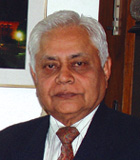INDIAN ARMED FORCES CHIEFS ON OUR RELENTLESS AND FOCUSED PUBLISHING EFFORTS

The insightful articles, inspiring narrations and analytical perspectives presented by the Editorial Team, establish an alluring connect with the reader. My compliments and best wishes to SP Guide Publications.

"Over the past 60 years, the growth of SP Guide Publications has mirrored the rising stature of Indian Navy. Its well-researched and informative magazines on Defence and Aerospace sector have served to shape an educated opinion of our military personnel, policy makers and the public alike. I wish SP's Publication team continued success, fair winds and following seas in all future endeavour!"

Since, its inception in 1964, SP Guide Publications has consistently demonstrated commitment to high-quality journalism in the aerospace and defence sectors, earning a well-deserved reputation as Asia's largest media house in this domain. I wish SP Guide Publications continued success in its pursuit of excellence.
Dassault & Airbus a Formidable Partnership
Although Dassault Aviation and Airbus have historically been rivals, under the newly emerging political dispensation, they have decided to jointly embark on a major venture of global significance
 | By Air Marshal B.K. Pandey (Retd) Former Air Officer Commanding-in-Chief of Training Command, IAF |

Early this year, the French aerospace major Dassault Aviation and the European conglomerate Airbus, made public their decision to enter into a partnership to jointly design, develop and produce the next generation combat aircraft - also described as Europe’s Future Combat Air System (FCAS). This platform which is planned to be superior to the existing fifth-generation combat aircraft such as the F-35 joint strike fighter from Lockheed Martin Corporation of the United States (US), is intended to initially complement and ultimately replace by the end of a decade and a half from now, the existing fleet of the fourth-generation Eurofighter Typhoon produced by a European consortium of Airbus, BAE Systems and Leonardo as also the Rafale produced by Dassault Aviation of France. Initially a partner in the Eurofighter Typhoon project, France had pulled out on account of serious differences with the other partners over the design of the aircraft and went ahead to develop the Rafale, a twin-engine, multi-role combat aircraft as a competitor to the European platform. Dialogue on the FCAS began some time ago and last year, the decision to go ahead with the project was taken in a meeting between Emmanuel Macron, President of France and Angela Merkel, Chancellor of Germany. The announcement on April 25, 2018, of the agreement between Dassault Aviation and Airbus, is the first step towards that goal.
Although Dassault Aviation and Airbus have historically been rivals, under the newly emerging political dispensation, they have now decided to join hands to embark on a major venture of global significance. One primary objective that has inspired this partnership is to challenge the dominant position of the US in the domain of the global aerospace industry and especially in the production of combat platforms. Another objective of the alliance appears to be an effort to ensure European sovereignty, industrial autonomy and technological leadership in the regime of military aerospace industry so that European nations do not have to purchase combat aircraft from the US.
The two aerospace giants Airbus and Dassault Aviation who are endowed with the right level of expertise and possess wealth of experience in the production of military aviation platforms, have already been cooperating successfully in projects in Europe related to the development of unmanned aerial systems. This new collaboration will also help strengthen ties between France and Germany especially in the context of the decision by Britain to exit the European Union. For British companies such as BAE Systems that has been a major partner in the Eurofighter Typhoon project, Brexit may have implications as the British aerospace firm could be excluded from the FCAS project. BAE Systems is also collaborating with Dassault Aviation in the development of an unmanned combat aircraft. Hopefully, a broader political perspective related to the security concerns of the European region as a whole, may help neutralise the shadow of Brexit and remove barriers between the UK and the Franco-German collaborative effort to pave the way for the inclusion of BAE Systems in the FCAS project. This step will undoubtedly be to the benefit of both the parties concerned.





